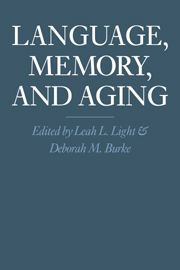Book contents
- Frontmatter
- Contents
- List of contributors
- Preface
- 1 Theories of information processing and theories of aging
- 2 Effects of aging on verbal abilities: Examination of the psychometric literature
- 3 Aging and individual differences in memory for written discourse
- 4 Geriatric psycholinguistics: Syntactic limitations of oral and written language
- 5 Aging and memory activation: The priming of semantic and episodic memories
- 6 Automatic and effortful semantic processes in old age: Experimental and naturalistic approaches
- 7 Integrating information from discourse: Do older adults show deficits?
- 8 Comprehension of pragmatic implications in young and older adults
- 9 Capacity theory and the processing of inferences
- 10 Age differences in memory for texts: Production deficiency or processing limitations?
- 11 Episodic memory and knowledge interactions across adulthood
- 12 The disorder of naming in Alzheimer's disease
- 13 Language and memory processing in senile dementia Alzheimer's type
- 14 Patterns of language and memory in old age
- Author index
- Subject index
14 - Patterns of language and memory in old age
Published online by Cambridge University Press: 05 January 2012
- Frontmatter
- Contents
- List of contributors
- Preface
- 1 Theories of information processing and theories of aging
- 2 Effects of aging on verbal abilities: Examination of the psychometric literature
- 3 Aging and individual differences in memory for written discourse
- 4 Geriatric psycholinguistics: Syntactic limitations of oral and written language
- 5 Aging and memory activation: The priming of semantic and episodic memories
- 6 Automatic and effortful semantic processes in old age: Experimental and naturalistic approaches
- 7 Integrating information from discourse: Do older adults show deficits?
- 8 Comprehension of pragmatic implications in young and older adults
- 9 Capacity theory and the processing of inferences
- 10 Age differences in memory for texts: Production deficiency or processing limitations?
- 11 Episodic memory and knowledge interactions across adulthood
- 12 The disorder of naming in Alzheimer's disease
- 13 Language and memory processing in senile dementia Alzheimer's type
- 14 Patterns of language and memory in old age
- Author index
- Subject index
Summary
The research discussed in the present volume indicates that language and memory do not decline uniformly in old age but that there are some aspects of each which are impaired and some which are spared. In this chapter, we focus on different approaches to understanding the patterns of impaired and spared functioning in language and memory in old age. The search for patterns that describe categories of behavior that share properties is prominent in several approaches to the study of memory and language. In experimental psychology, there is a tradition of concern for dissociations among different aspects of cognition (see Klatzky, this volume). Within the study of memory, distinctions have been made among a variety of memory systems (e.g., Atkinson & Shiffrin, 1968; Baddeley, 1986; Tulving, 1972, 1983). More generally, cognitive processes have been categorized as effortful or automatic (Hasher & Zacks, 1979). Within the neuropsychological literature, there is an attempt to identify patterns of behaviors that are impaired in particular neuropathological conditions (Squire, 1987). In the study of individual differences, the factor-analytic approach is widely used to identify patterns of association among specific abilities (Thurstone, 1938).
In this chapter, we consider what the experimental, neuropsychological, and individual-difference approaches contribute to our understanding of language and memory in old age. Within the experimental approach, we focus on certain memory distinctions, and, in our final section, on distinctions between automatic and effortful processes.
Information
- Type
- Chapter
- Information
- Language, Memory, and Aging , pp. 244 - 272Publisher: Cambridge University PressPrint publication year: 1988
Accessibility standard: Unknown
Why this information is here
This section outlines the accessibility features of this content - including support for screen readers, full keyboard navigation and high-contrast display options. This may not be relevant for you.Accessibility Information
- 23
- Cited by
